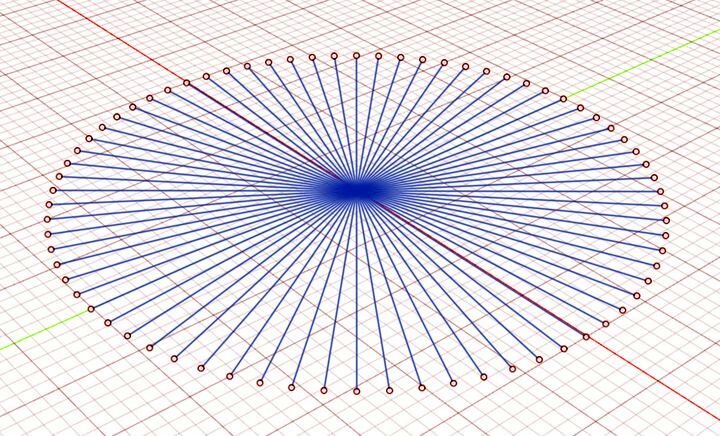![Volumetric 3D printing involves light projection from all angles [Source: Fabbaloo]](https://fabbaloo.com/wp-content/uploads/2020/05/volumetric-density_img_5eb05087a2833.jpg)
The biggest thing to hit 3D printing in the next few years is likely to be volumetric 3D printing. But who’s developing it?
If you haven’t seen our previous stories on the tech, let me provide you with a quick overview of volumetric 3D printing.
Volumetric 3D Printing
It’s a resin-based process that doesn’t use lasers or even a layer-by-layer approach. Instead, a pattern is projected into a vat of transparent photopolymer liquid repeatedly from all angles. It’s must like a CT scan, except in reverse: the pattern is projected to form the object instead of scanning the object.
The upshot of the technology is that it could provide the most dramatic speedup in the 3D printing world ever seen, as volumetric processes essentially form the entire object simultaneously, rather than the now-tedious layer-by-layer approach that’s more commonly used by every existing 3D printing process.
If those developing the technology below are successful, it could provide incredible benefits for many 3D printer operators who could leverage speed increases for new applications, yet also pose significant issues for existing 3D printer manufacturers, who would suddenly find themselves with machines that are 1000x slower than the competition.
List of Volumetric 3D Printing Projects
With such promise, one wonders which organization will succeed in this new volumetric world to come. We did some searching, called in a few favors and came up with a list of every volumetric 3D printing operation known. There are probably more that we’re not aware of, and certainly there will be some stealthy companies that will appear within the next year or so.
University of Michigan
![Volumetric 3D print sample [Source: U of Michigan]](https://fabbaloo.com/wp-content/uploads/2020/05/volumetric-umich_img_5eb05087deb4b.jpg)
A group at the University of Michigan including Martin P. de Beer, Harry L. van der Laan, Megan A. Cole, Riley J. Whelan, Mark A. Burns, and Timothy F. Scott. Published a paper entitled, “Rapid, continuous additive manufacturing by volumetric polymerization inhibition patterning”. This process seems to use two-color irradiation of specialized resins containing both photoinitiator and photoinhibitors.
DAQRI
![Volumetric 3D printing rig [Source: DAQRI]](https://fabbaloo.com/wp-content/uploads/2020/05/image-asset_img_5eb050882e64f.jpg)
DAQRI had been working on a volumetric process involving holograms as of 2016, but it seems the company refocused on development of AR equipment and then subsequently shut its doors in 2019. It is not known if the 3D printing technology has been passed on to other parties.
LLNL / Berkeley
![Volumetric 3D printing experiment [Source: Berkeley]](https://fabbaloo.com/wp-content/uploads/2020/05/image-asset_img_5eb050886cdff.jpg)
The LLNL / Berkeley team developed a method of coaxial 3D printing based on reverse CT scanning they call “CAL”, which we wrote about last year.
Siemens
![Illustration of Siemens’ volumetric 3D printing patent concept [Source: USPTO]](https://fabbaloo.com/wp-content/uploads/2020/05/image-asset_img_5eb05088ac533.jpg)
Siemens holds a patent on a form of volumetric 3D printing, US20180250890 – SYSTEMS AND METHODS OF VOLUMETRIC 3D PRINTING. This system uses two beams that, when intersecting, provide sufficient energy to cause solidification. Otherwise the beams traverse the transparent photopolymer freely.
Disney
![Illustration of Disney’s volumetric 3D printing patent concept [Source: USPTO]](https://fabbaloo.com/wp-content/uploads/2020/05/volumetric-disney_img_5eb05088ea4bb.jpg)
Disney holds a patent for “near instantaneous object printing using a photo-curing liquid”, which seems to be a form of volumetric 3D printing. It is entirely unclear why Disney would have such a technology nor whether they would ever make use of it.
Xolo
![Some type of volumetric 3D printing happening in a resin vat [Source: Xolo]](https://fabbaloo.com/wp-content/uploads/2020/05/image-asset_img_5eb05089381a9.jpg)
Unlike the research projects or stray patents mentioned above, xolo is a stealthy startup that is definitely working actively on a volumetric 3D printing process. How do we know this? Their brief, single page website says they are “The Volumetric 3D Printing Solution”. There’s no further information on how their process specifically works, nor when they expect to release a product. This could be one of the more promising ventures in volumetric 3D printing.
The University of Freiburg’s NeptunLab
NeptunLab works on all sorts of interesting projects, but currently list none related to volumetric 3D printing. However, there is a now-expired job posting for a “PhD Position – Chemistry and Chemical Engineering – Chemistry for volumetric 3D Printing”. That’s kind of a giveaway, suggesting they are indeed working in some fashion on volumetric 3D printing and have yet to publish a paper on the topic.
Readily3D
![#3DBenchy being 3D printed volumetrically [Source: Readily3D]](https://fabbaloo.com/wp-content/uploads/2020/05/readily3d-benchy_img_5eb0508988392.jpg)
Readily3D is one of the very few commercial ventures that have publicly announced their work on volumetric 3D printing. The company appears to be a spin off of research done by EPFL, and this is likely the pattern we’ll see from other research projects mentioned here.
Adrian Bowyer’s Electric 3D Printing
![Electric 3D Printing concept [Source: Adrian Bowyer]](https://fabbaloo.com/wp-content/uploads/2020/05/image-asset_img_5eb05089c4616.jpg)
Bowyer is one of the historic personalities in 3D printing, having launched the RepRap project that generated the desktop 3D printing phenomenon. Now he’s working on a new volumetric concept he calls “Electric 3D Printing”. This process combines several research developments together to create a system that could potentially 3D print in many different materials.
Jean-Claude André
Finally, we hear rumors that Jean-Claude André is working with a research group located in Marseille, France on some form of volumetric 3D printing. However, I am unable to find any reference to this work, which could be kept secret for the time being. André is notable in that he is one of three people who filed a patent in 1984 mere weeks before 3D Systems’ Chuck Hull filed a similar patent on SLA 3D printing. However, it turned out André’s employers abandoned the patent, leaving it an open field for Hull to exploit. Now it seems that André may be working towards a second 3D printing revolution.
Did I miss any? Are you aware of any volumetric 3D printing projects that should be added to the list? Let us know in the comments.


Currently developed a volumetric printer for my undergraduate project. More information can be found here!
https://www.youtube.com/watch?v=_9Z4HzItfj8
Thanks! We will check it out.